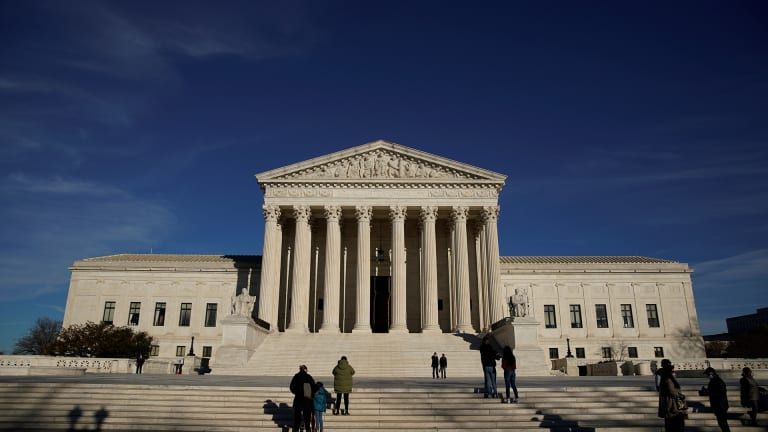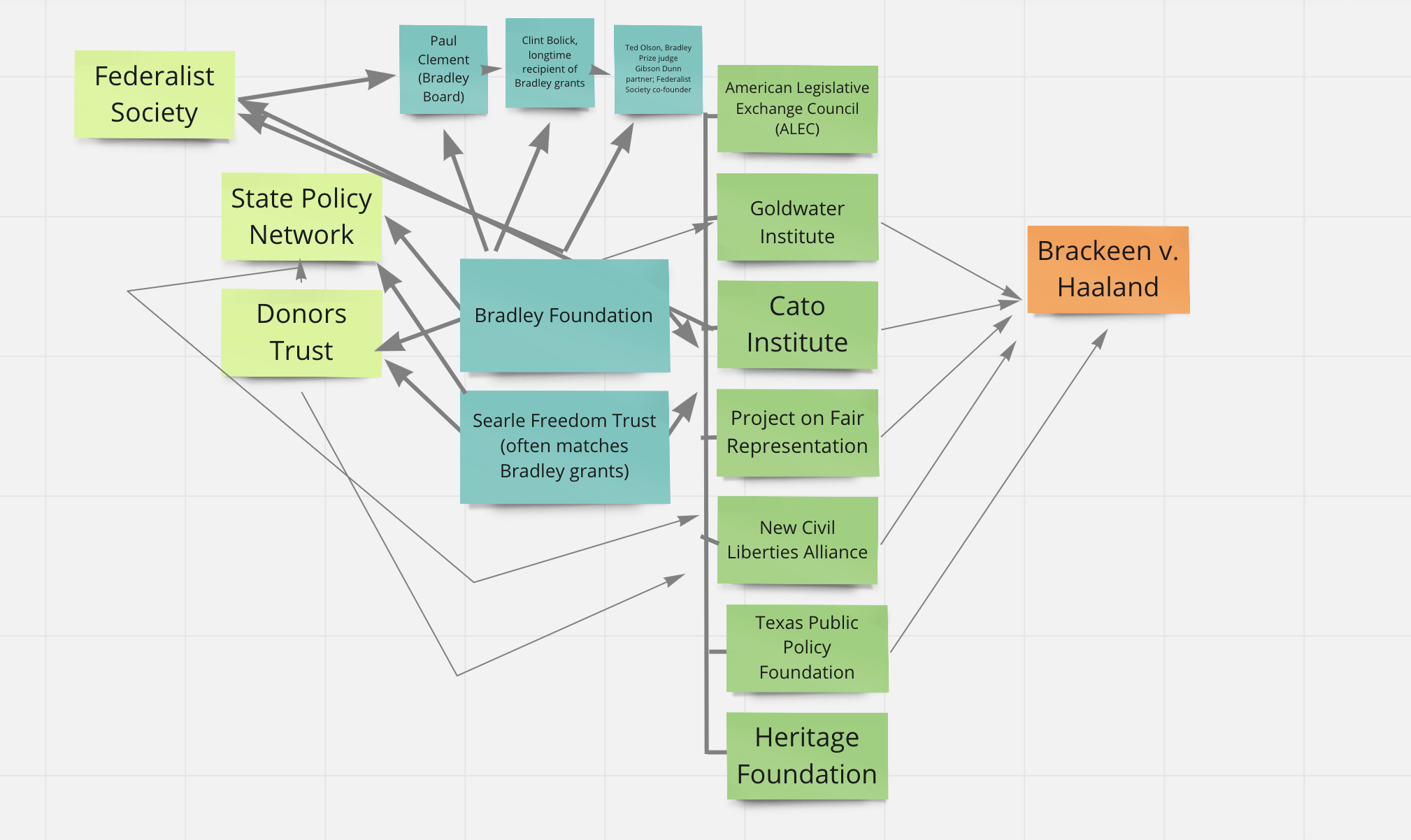The Conservative Legal Strategy Goes Far Beyond the Supreme Court

First things first: I am not a lawyer. Nor did I attend law school. I have, however, covered litigation quite a bit throughout the past 20 years. In the most recent 5 years, I've covered dozens of climate cases, and in 2020 and 2021 I led a team of investigative reporters looking into the players involved in one of this Supreme Court session's more high-profile cases (Brackeen v Haaland) for the podcast This Land. What I've learned in the course of that work about the conservative legal strategy is something I think everyone should know. And especially in the wake of the last year of tremendous civil rights losses via the courts, I figure now is a good time to break it all down.
First, it's important that folks get that this strategy doesn't begin or end with appointing judges. That happens to be the piece that's gotten the most press, and deservedly so, with dozens of articles about the Federalist Society and its role in supplying a short list of "approved" judicial nominees to Republican presidents over the years. The man behind that strategy (although there have been others) is worth knowing about too: Leonard Leo, a fanatically Catholic, pro-corporate warrior who never met a business regulation or a civil right he doesn't hate. Leo's dream is a fully privatized America, think pre-New Deal, Industrial Revolution-era, where really only rich white men have rights and corporations are allowed to operate with impunity. He doesn't just hate taxes and environmental regulations, he also thinks public school is the devil and people should probably pay to drive on roads too.
When Leo and his plan at the Federalist Society was unmasked (thanks in large part to the research Lisa Graves did at the Center for Media and Democracy, and subsequent reporting from folks at The Washington Post, Pro Publica, and The New York Times), he went further underground. With billions of dollars from industrialist Barre Seid to play with, Leo got involved with two new orgs: Consumers Research and CRC Advisors. He has continued to fund litigation-related efforts through those organizations.
But of course, picking all your favorite judges only helps if you can also bring the right cases before them, and that whole piece of the conservative legal machine has been remarkably under-covered. Oftentimes when rulings like this week's come out, I see a lot of articles and social media posts about the named plaintiffs in cases. The web designer who doesn't want to make wedding websites for gay couples (never mind that she's never been asked to), the wealthy couple that doesn't want to get permits for their lakefront home. These people are easy to hate, yes, and that is entirely why they were selected by the actual people bringing these cases: organizations with deep-pocketed conservative funders (many of which, yes, do link back to Leo in some way or another).
Let's take Brackeen as an example since I happen to have spent a gazillion hours looking at that case from every angle. The Brackeens are an evangelical Christian couple who live outside of Fort Worth, Texas. They signed up to be foster parents and after an initial difficult placement were handed a happy, easy baby to care for while his biological parents tried to get their lives together. They were told in no uncertain terms that this baby would never be available to them for adoption: He was a Native child with enrolled relatives in two tribes (Cherokee and Navajo). Besides that, several of his biological relatives and at least one non-related tribal family were interested in adopting him. But after having him in their home for several months, the Brackeens got more and more attached and began thinking of the Indian Child Welfare Act—the law they saw as primarily responsible for blocking their ability to adopt him—as unfair. It's easy to have a bit of empathy here; yes, foster parents shouldn't enter into fostering if they aren't prepared to return a child to their biological family, but also most folks can relate to how hard it might be to hand over a small child that's grown to see you as their parent. The Brackeens decided to take it to court and they lost.
That's when things took a turn. As Jennifer Brackeen put it, a "miracle" happened. A corporate law firm had heard about their case somehow and offered to take on their appeal pro bono. Had this law firm not appeared, Ms. Brackeen makes it very clear on her blog, the Brackeens would not have continued to fight. That law firm was Gibson Dunn, a corporate firm that represents multiple large corporations, including Chevron. We'll get to that in a minute. First, how did these guys show up in a family court case?
Well, Brackeen was not the first anti-ICWA case. The law was passed unanimously in 1978 as a response to the astronomically high rate at which Native kids were being removed from their families and tribes and placed with non-Native families. It went relatively unchallenged for more than 30 years. Then in 2013, former solicitor general Paul Clement brought a high-profile case to the Supreme Court: Baby Girl. The case failed to overturn ICWA but the court did side with the adoptive couple, and deliver some meaningful blows to the law. It was a blood in the water moment. Suddenly every conservative org worth their Koch donation was taking on an ICWA case. The Goldwater Institute, a conservative think tank and law firm in Arizona, started a whole program focused on it, with money from The Bradley Foundation. Why ICWA? Because the argument in these cases is that ICWA is race-based and therefore unconstitutional. It's the exact same argument used in the affirmative action case the court just ruled on. And Clint Bolick, who ran Goldwater's Constitutional Law Center and got Bradley to fund this project, is one of the original architects of litigation aimed at removing any sort of racial preference from the law (in the 90s, the LA Times referred to Bollick as "the original aggrieved white man," an apt description). The key difference with ICWA is that "Indian" as it pertains to a legal designation, has always been political, not racial. The law defines an Indian person as someone who has citizenship or is eligible for citizenship in a tribe with which the United States has a treaty. Every tribe has different citizenship requirements, and some do have a blood quantum requirement, which makes it complicated, but nonetheless tribal identity remains political not racial.
The anti-ICWA cases attempt to upend that distinction and, in so doing, unravel the basis for tribal sovereignty. Which brings us back to why the heck Gibson Dunn would turn up in family court. The firm's large number of gaming and fossil fuel clients seems like a reasonable place to start answering that question. Similarly, with the Bradley Foundation, Goldwater, Cato, and multiple other Koch-backed organizations getting involved in the quest to take down ICWA it's hard to ignore the profit motive lurking just behind the ideology. Are these organizations that love a good "reverse racism" argument? Oh, definitely. But they're also vehemently opposed to any limits on capitalism, be they treaties that keep corporations off certain land and water or environmental regulations that increase costs or limit business activities.
Similar groupings of organizations show up in various other Supreme Court Cases, too. Let's look just at the current session. In addition to Brackeen, there was Sackett v EPA, which kneecapped the Clean Water Act earlier this year. The plaintiffs were selected by Pacific Legal Foundation (which also submitted a brief in Brackeen), an anti-regulatory nonprofit law firm initially funded by the Scaife Foundations, a trio of foundations that were directed by the late billionaire Richard Mellon Scaife, whose wealth was inherited from the Mellon industrial, oil, aluminum and banking fortune. The Scaife Foundations have invested billions over the years in lock step with the Koch brothers in organizations like the Heritage Foundation, the American Legislative Exchange Council, and the Cato Institute. The U.S. Chamber of Commerce, which also routinely shows up in these big conservative battleground cases, filed a brief on behalf of the Sacketts, as did the Cato Institute and Americans for Prosperity Foundation (the 501C3 twin to the Koch brothers' 501C4 battleship Americans for Prosperity).
In 303 Creative v Elenis, the case of the web designer who didn't want to make wedding websites for queer couples, the plaintiff was selected by the Alliance Defending Freedom, an organization focused on what they call "Christian legal issues," which includes religious freedom, anti-LGBTQ cases, and anti-abortion cases. One of their largest donors is Donors Trust, an entity Mother Jones once described as the "dark money ATM of the conservative movement." Gibson Dunn attorney Allyson Ho, a partner in the firm's Dallas office and the spouse of 5th Circuit of Appeals justice James Ho (who yes was on Leo's shortlist and appointed by Trump) frequently takes on pro-bono cases for the Alliance Defending Freedom. Filing briefs in support of the web designer were: Americans for Prosperity Foundation and the Cato Institute.
The affirmative action case, Students for Fair Admissions v President and Fellows of Harvard College, is one I also tracked for a long time because it had not only a legal argument but also so many organizations in common with the legal attack on ICWA. The architect of that case was a guy named Edward Blum who first burst on the scene with the ill-fated case of Abigail Fisher, a mediocre student who was convinced she'd been denied entry to University of Texas at Austin because of "reverse racism." Blum is not a lawyer, but he had started an organization called the Project for Fair Representation that aimed to bring lawsuits that could kill off affirmative action once and for all. His primary backers in that endeavor were the Bradley Foundation and the Searle Freedom Trust (Bradley and Searle often fund initiatives in tandem and match donations; they did it with Goldwater on the ICWA project too). Kim Dennis, the CEO of Searle, also happens to be chairman of the board for Donors Trust. Searle is also a big donor to the Pacific Legal Foundation, the Cato Institute, the Heritage Foundation, the State Policy Network (Koch's network of conservative organizations focused on state policy), and the American Legislative Exchange Council which focuses on passing new laws that benefit corporations. No surprise, then, to see briefs in support of the plaintiffs from Pacific Legal and mutliple members of the Republicans Attorney General Association (RAGA).
Speaking of RAGA, they were behind Biden v Nebraska, the student loan forgiveness case, with AGs from Missouri and Nebraska tag-teaming to block Biden and getting a brief in support from their RAGA colleagues in Utah, Ohio, Alabama, Alaska, Arizona, Florida, Georgia, Indiana, Louisiana, Mississippi, Montana, New Hampshire, North Dakota, Oklahoma, Texas, West Virginia, and Wyoming. Again, Americans for Prosperity Foundation showed up to file a brief, too. Noticing a pattern yet?
This is the crazy murder wall we pieced together on Brackeen v Haaland, but it maps reasonably well onto any conservative interest case that's headed to the Supreme Court in the past 10 or so years.

Which brings us to the process. If you're a conservative legal advocacy outfit and you want to get your 15 minutes at the Supreme Court so you can keep those sweet Koch/Scaife/Searle/Bradley dollars rolling in, first you need a legal theory, then you need a perfect plaintiff. And part of what makes them perfect is not just that they slot neatly into your legal theory but also that they happen to reside in a district where one of those judges Leonard Leo helped to install is ready and waiting to rule in their favor.
Here's how it worked in Brackeen. Gibson Dunn showed up not only because the Brackeens were perfect plaintiffs in one way—their foster child was part Navajo, and Navajo has a blood quantum requirement, which the anti-ICWA folks were looking for—but also in another really important way: they live in Tarrant County, where one of former Texas AG Ken Paxton's favorite judges, Justice Reed O'Connor, presides. O'Connor had never seen a constitutional challenge from Paxton he couldn't get behind, so when Gibson Dunn went to court, they got the Texas Attorney General involved right away. And by right away, I mean in family court. Imagine if you were battling your ex for custody and they showed up with the state attorney general on their side, that's what happened here.
By the time the case reached O'Connor's court it was on the fast track to the Supreme Court. Gibson Dunn attorneys requested summary judgement, which meant that when the case moved on to the 5th Circuit Appeals Court it would be absent a whole lot of pesky details from the underlying family court case, including the fact that several of the child's biological relatives had tried to adopt him. (Our reporting on This Land reintroduced those details on the way to the Supreme Court). The 5th Circuit, of course, is where longtime Gibson Dunn partner James Ho now sits on the bench. Ho did recuse himself from this case, because he ran Gibson Dunn's Dallas office when they started working on Brackeen, but still they knew the 5th Circuit was likely to deliver what they needed: a messy ruling split across ideological lines, with the couple of more liberal justices supporting ICWA and more conservative justices calling it an unconstitutional violation of the equal protection clause of the 14th amendment. And off to the Supreme Court it went. Extremely important detail here: by the time it was headed to the Supreme Court, the Brackeens had already won custody. Their adoption of the child in question was finalized, which means they had no reason to be in court. But when a high-priced corporate law firm takes your custody case on pro bono, the least you can do is continue to be the front for their constitutional challenge, I guess.
Long before a decision came down in that case, journalist Rebecca Nagle, who hosts This Land and has been following and reporting on the attack on ICWA for years, heard about the one right behind it, this time filed in Missourri, where a Gibson Dunn attorney and former solicitor general Paul Clement showed up in rural family court to argue on behalf of the adoptive couple. Because that's part of the machinery too. You can never assume that your first perfect plaintiff will do it, there's got to be a funnel of cases ready to go.
That's true of attacks on climate action too, which are coming from the exact same network of people. Lisa Graves has said to me a few times that for the Kochs, "carbon is job number one," meaning they will work to shut down any regulation of CO2 by any means necessary. And I think we all know, they have a lot of means.
This Week's Climate Must-Reads
- The Energy Transition Will Be Volatile - This, from Derek Brower, Amanda Chu and Myles McCormick, ran in the FT's newsletter, which you can subscribe to here, and included this, from one of the most staid financial publications in the world: "Capitalism won’t deliver the energy transition fast enough . . . There’s too much to do, and given the urgency and the need to get the solution right, this isn’t a task for your favourite ESG-focused portfolio manager or the tech bros. The sheer scale of the physical infrastructure that must be revamped, demolished or replaced is almost beyond comprehension. Governments, not BlackRock, will have to lead this new Marshall Plan. And keep doing it."
- Solar Sprawl Is Tearing Up the Mojave Desert—Is There a Better Way? - I remember reading stories like this from Sammy Roth back when he was working for The Desert Sun, which is why I was so excited to see him working for the Los Angeles Times. This is a smart, nuanced look at the complexities involved in balancing conservation and the need to transition rapidly away from fossil fuels.
- City In a Forest - For Harper's, Max Saltman put together this very cool snapshot of what's been happening as forest defenders fight the proposed police training complex known as "Cop City." " The city planning department once deemed this forest one of Atlanta’s 'lungs,'"Saltman writes, "promising to build a thousand-acre park, and work began on converting land into a nature reserve. Any planning for a park on this site, however, ended once Bottoms announced the training facility."
- Homecoming: A Series - This incredible multi-part series from photojournalist Justin Cook digs into climate solutions in Princeville, North Carolina, America's oldest incorporated Black town.
- Debating Antivaccine Cranks Debases Science and Harms the Public - A blistering and excellently reasoned argument against debating with science denialists of any kind, from David Robert Grimes for Scientific American. It's a mistake, Grimes says, no matter how well intended, "to participate in an adversarial format that presents science and pseudoscience as equals, creating a false balance between truth and lies."





